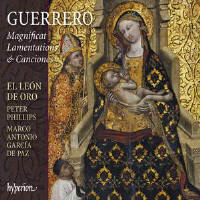Texte paru dans: / Appeared in: |
|
|
Outil de traduction (Très approximatif) |
|
|
Reviewer: Edward Breen This new disc by the Spanish choir El León de Oro of music by Francisco Guerrero (1528-99) joins an impressive line of recordings on the Hyperion label, whose dedication to Iberian repertoire is notable. Opening with Magnificat quarti toni, their radiant choral sound is carried by a convincing momentum. With nearly 40 singers, the phrases are confident and broad but never strident: this approach lends an especially atmospheric air to the Lamentations, where vowel sounds are soft and few consonants penetrate the warm glow of the generous acoustic. The result is a delightfully rich sonic bath that departs significantly from many British ensembles’ approach. Despite the sudden mood/mode shift between Sancta et immaculata and Regina caeli a 8, the latter motet is a particularly fine performance. Those who know it from Westminster Cathedral Choir (Hyperion, 8/99) or The Cardinall’s Musick (10/10) will appreciate the larger choral approach to this work in particular. No selection of Guerrero’s motets is complete without a recording of his exquisite Ave virgo sanctissima but here I wished for more alto presence in the extraordinary rising phases. Instead they maintain focus on large-scale mood: great swathes of rich polyphony again have a beautiful momentum, especially at ‘Salve semper gloriosa’ (‘Hail, ever-glorious one’). The lesser-known works from Canciones y villanescas espirituales are notable for Guerrero’s remarkably tuneful style. Knowing the selection previously recorded by La Colombina (K617, 9/07), I would prefer solo voices in these textures for a more nuanced interpretation. Take, for instance, Mi ofensa’s grande (‘My offence is great’). El León de Oro completely avoid any madrigalist word-painting: ‘tu muerte y sangre’ (‘your death and blood’) and even ‘¡Ay, Dios! que te ofendí’ (‘O my God! I offended you’) could benefit from more style delineation from the motet performances.
|
|




